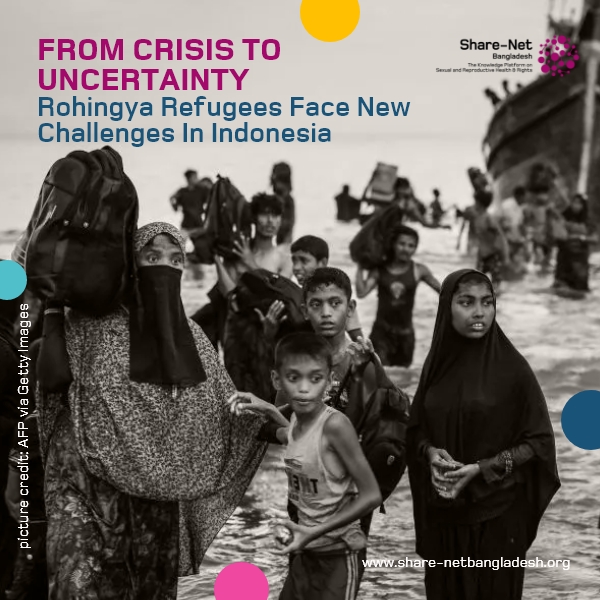From Crisis to Uncertainty: Rohingya Refugees Face New Challenges in Indonesia
“As we mark World Refugee Day on June 20, more than 1 million Rohingya languish in squalid, violence-plagued camps around Cox’s Bazar in Bangladesh.”
This stark reality is driving many Rohingya, including women and children, to embark on perilous sea voyages to Indonesia, hoping for a better life. However, upon arrival, most find themselves in Aceh province, one of Indonesia’s poorest regions, where they face hostility from locals and a murky future.
Sexual and reproductive health and rights (SRHR) are critical issues for these refugees. In Aceh, Rohingya women and girls suffer from poor access to healthcare, education, and employment, compounded by Indonesia’s struggling social systems. The United Nations Population Fund (UNFPA) has reported a dire funding gap in Cox’s Bazar, leading to desperate survival strategies like forced early marriage. Such practices highlight the urgent need for integrated SRHR services and protections, as outlined in the Sustainable Development Goals (SDGs), particularly SDG 3 (Good Health and Well-being) and SDG 5 (Gender Equality).
The Rohingya’s journey to Indonesia is fraught with danger. Many are crammed onto overcrowded boats by people smugglers, facing starvation, dehydration, and abuse. Upon reaching Aceh, they encounter a new set of challenges. The province, already grappling with poverty and food insecurity, struggles to provide adequate support. Refugees are often subjected to discrimination, limiting their access to essential services and exacerbating their vulnerabilities.
Research by the International Organization for Migration (IOM) reveals that psychological distress, trauma, and untreated infections are common among Rohingya refugees in Aceh. These health issues underline the importance of incorporating refugees into universal health coverage (UHC), a goal that ASEAN member states, including Indonesia, aim to achieve by 2030. However, current systems often exclude refugees, who face barriers like unaffordable healthcare costs and lack of legal recognition.
The absence of formal systems for permanent resettlement in both Bangladesh and Indonesia leaves refugees in a state of limbo. In Indonesia, the lack of employment rights and inadequate humanitarian aid force many refugee women into precarious situations, increasing their risk of gender-based violence, exploitation, and mental health issues. The Sustainable Development Goals emphasise the need for inclusive policies that ensure access to health services for all, including refugees, to foster sustainable development and social harmony.
Innovative approaches are essential to address these challenges. A project by Monash University, Indonesia, in collaboration with the refugee women-led organisation Sisterhood, is developing inclusive health interventions in the greater Jakarta region. Such initiatives can provide valuable insights into best practices that promote evidence-based policies benefiting both refugees and host communities. For example, allowing Rohingya women to work alongside Bangladeshi midwives in Cox’s Bazar has nurtured social harmony and opened livelihood opportunities, aligning with SDG 8 (Decent Work and Economic Growth).
Civil society and non-governmental organisations play a crucial role in advocating for the inclusion of refugees in national health insurance systems. By recognising refugees as part of regional public health issues, stakeholders can amplify public awareness and push for policies that integrate refugees into UHC frameworks. Ensuring essential and quality health services for refugees is not only a moral imperative but also a practical necessity for achieving sustainable development.
The plight of the Rohingya in Aceh underscores the interconnectedness of health, human rights, and sustainable development. As ASEAN member states work towards UHC by 2030, it is vital to include refugees in these efforts, ensuring that no one is left behind. Only through inclusive and comprehensive policies can the region address the complex needs of its most vulnerable populations and move closer to achieving the SDGs.
Source Contributors:
- Anak Agung Istri Diah Tricesaria, PhD candidate and Herb Feith Scholar at School of Social Sciences, Faculty of Arts, Monash University, Australia.
- Dr Sabina Satriyani Puspita, Deputy Director of Monash Herb Feith Indonesian Engagement Centre and Assistant Professor, Monash University, Indonesia.
- Dr Gabriela Fernando, Assistant Professor at Monash University, Indonesia.
Source: Eco-Business
Picture Credit: AFP via Getty Image


